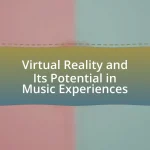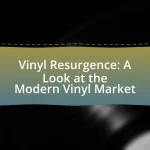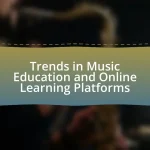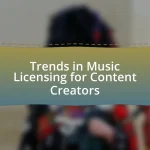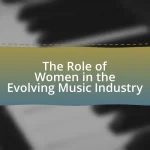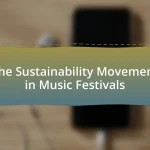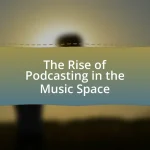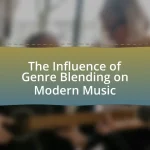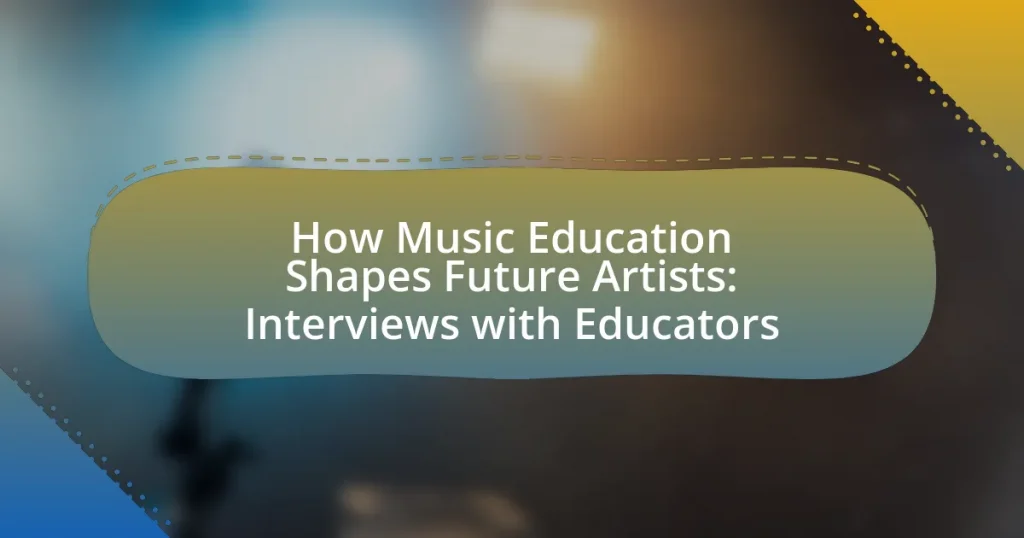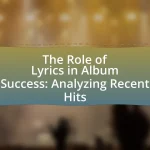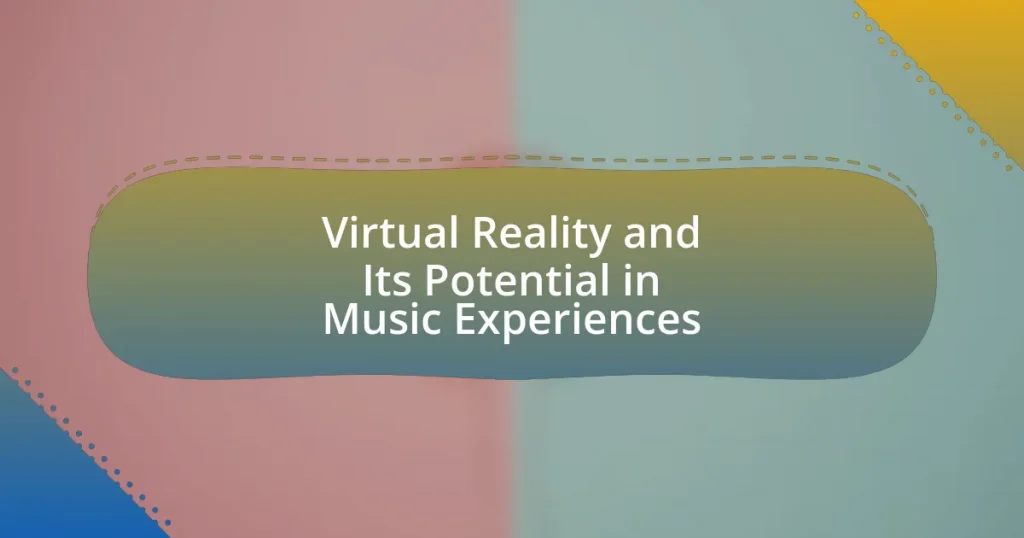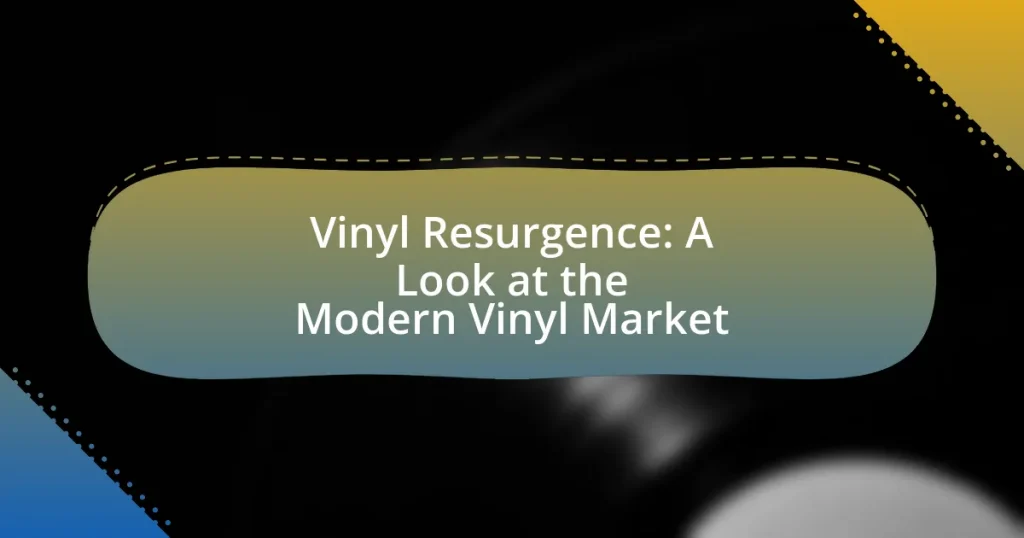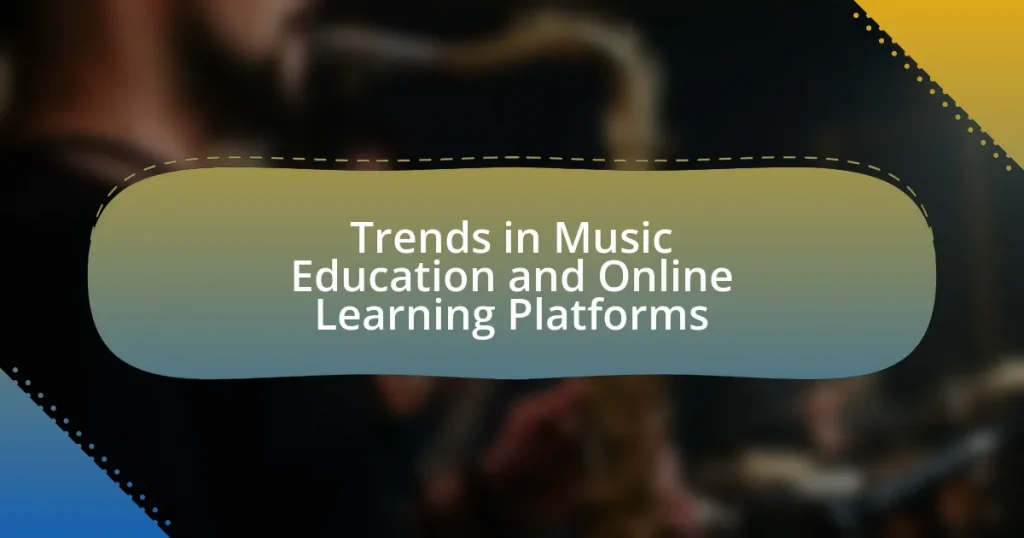The article examines the significant impact of music education on the development of future artists, highlighting how it enhances technical skills, creativity, and emotional expression. Key components such as technical skill development, theoretical knowledge, and creative expression are discussed, along with the influence of curriculum choices and performance opportunities on artistic growth. The article also addresses the essential skills gained through music education, the insights of educators regarding its effectiveness, and the challenges faced in delivering quality music programs. Furthermore, it explores innovative practices and the role of technology and community involvement in enriching music education, ultimately emphasizing the importance of a comprehensive approach to support aspiring artists.
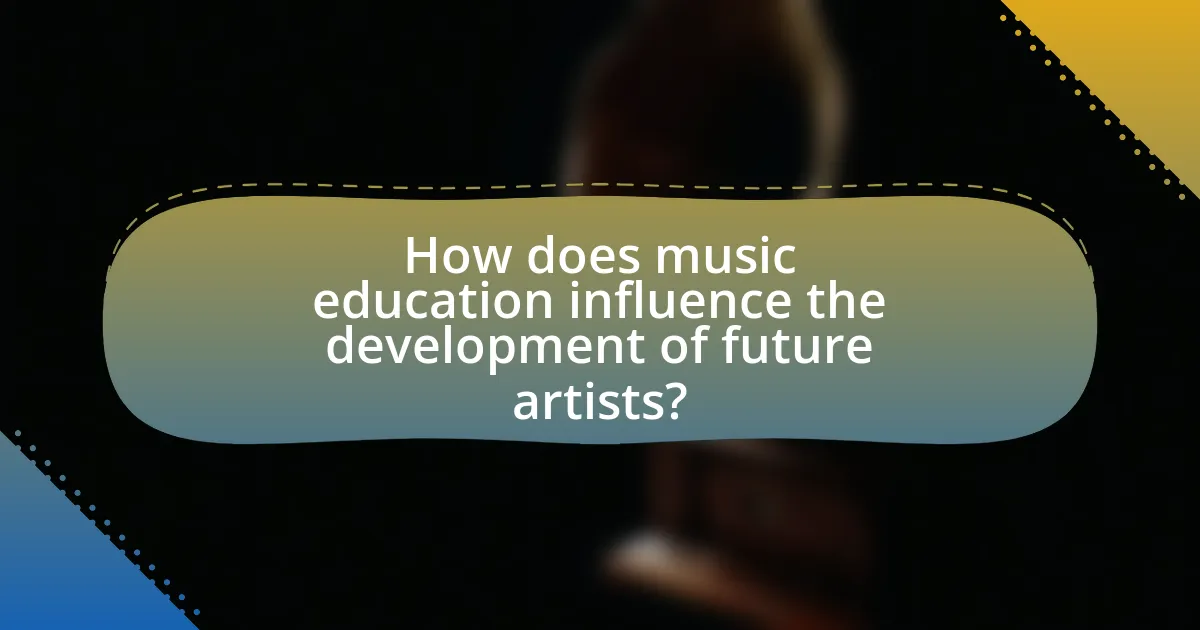
How does music education influence the development of future artists?
Music education significantly influences the development of future artists by enhancing their technical skills, creativity, and emotional expression. Through structured learning, students acquire essential musical techniques and theory, which form the foundation for their artistic expression. Research indicates that music education fosters cognitive development, improving skills such as memory, attention, and problem-solving, which are crucial for artistic innovation. For instance, a study published in the Journal of Research in Music Education found that students involved in music programs showed higher academic performance and greater creativity compared to their peers without such education. This evidence underscores the vital role of music education in shaping well-rounded, innovative artists.
What are the key components of music education that shape artists?
The key components of music education that shape artists include technical skill development, theoretical knowledge, and creative expression. Technical skill development involves mastering instruments and vocal techniques, which are essential for performance proficiency. Theoretical knowledge encompasses understanding music theory, composition, and history, providing a foundation for artistic interpretation and innovation. Creative expression encourages students to explore their unique musical voices, fostering individuality and personal style. Research indicates that comprehensive music education programs enhance cognitive abilities and emotional intelligence, further supporting artistic growth and development.
How do curriculum choices impact artistic growth?
Curriculum choices significantly impact artistic growth by shaping the skills, techniques, and creative thinking of students. A well-structured curriculum that includes diverse artistic disciplines fosters a comprehensive understanding of art, encouraging students to explore various mediums and styles. Research indicates that students exposed to a broad range of artistic experiences demonstrate higher levels of creativity and innovation, as evidenced by a study published in the Journal of Aesthetic Education, which found that interdisciplinary approaches in arts education enhance critical thinking and problem-solving skills. Thus, the selection of curriculum directly influences the depth and breadth of artistic development in students.
What role do performance opportunities play in artist development?
Performance opportunities are crucial for artist development as they provide practical experience and exposure to live audiences. Engaging in performances allows artists to refine their skills, build confidence, and receive immediate feedback, which is essential for growth. Research indicates that artists who regularly perform are more likely to develop a unique style and stage presence, as they learn to connect with their audience and adapt to different environments. For instance, a study published in the Journal of Music Education found that students who participated in live performances showed significant improvement in their musical abilities and self-efficacy compared to those who did not. Thus, performance opportunities serve as a vital component in the holistic development of artists.
Why is music education essential for aspiring artists?
Music education is essential for aspiring artists because it provides foundational skills and knowledge necessary for artistic development. Through structured learning, artists gain proficiency in music theory, composition, and performance techniques, which are critical for their creative expression. Research indicates that students engaged in music education demonstrate improved cognitive abilities, including enhanced memory and problem-solving skills, which are beneficial in artistic endeavors. Additionally, music education fosters collaboration and communication skills through group performances and ensemble work, preparing artists for the collaborative nature of the music industry.
How does music education foster creativity and innovation?
Music education fosters creativity and innovation by providing students with the tools to express themselves and explore new ideas through sound. Engaging in music education encourages critical thinking and problem-solving skills, as students learn to interpret, compose, and perform music, which requires them to think outside the box. Research conducted by the Arts Education Partnership indicates that students involved in music programs demonstrate higher levels of creativity and cognitive flexibility compared to their peers. Additionally, music education promotes collaboration and communication, as students often work together in ensembles, leading to innovative group dynamics and shared creative processes.
What skills do students gain through music education that benefit their artistic careers?
Students gain critical skills through music education that significantly benefit their artistic careers, including creativity, discipline, collaboration, and technical proficiency. Creativity is fostered as students learn to compose and interpret music, allowing them to express unique artistic visions. Discipline is developed through regular practice and performance preparation, which instills a strong work ethic essential for any artistic endeavor. Collaboration skills are enhanced as students participate in ensembles, learning to work effectively with others towards a common goal. Technical proficiency is achieved through the mastery of instruments or vocal techniques, providing the foundational skills necessary for professional performance. These skills are supported by research indicating that music education enhances cognitive abilities and emotional intelligence, both of which are crucial in the arts.
What insights do educators provide about music education’s impact?
Educators highlight that music education significantly enhances cognitive development, emotional intelligence, and social skills in students. Research indicates that students engaged in music education demonstrate improved academic performance, particularly in subjects like math and reading, due to the development of critical thinking and problem-solving skills. For instance, a study by the Arts Education Partnership found that students involved in music programs scored higher on standardized tests compared to their peers who did not participate in such programs. Additionally, educators note that music education fosters collaboration and communication skills, as students often work together in ensembles, promoting teamwork and interpersonal relationships.
How do educators perceive the relationship between music education and artistic success?
Educators generally perceive a strong relationship between music education and artistic success, viewing music training as foundational for developing creativity and technical skills. Research indicates that students engaged in music education often demonstrate enhanced cognitive abilities, which contribute to their overall artistic expression and success in various creative fields. For instance, a study published in the Journal of Research in Music Education found that students who participated in music programs scored higher on standardized tests and exhibited greater emotional intelligence, both of which are critical for artistic achievement. This correlation suggests that music education not only fosters musical talent but also cultivates essential skills that lead to broader artistic success.
What common themes emerge from educators’ experiences with students?
Common themes that emerge from educators’ experiences with students include the importance of emotional connection, the role of creativity in learning, and the impact of individualized instruction. Educators frequently report that building strong relationships with students enhances engagement and motivation, which is crucial in music education. Additionally, creativity is often highlighted as a vital component, as it allows students to express themselves and develop their unique artistic voices. Furthermore, individualized instruction tailored to each student’s needs and learning styles is emphasized, as it fosters a more effective learning environment and encourages personal growth in musical skills. These themes are consistently observed across various interviews and studies focused on music education.
How do educators measure the effectiveness of music education programs?
Educators measure the effectiveness of music education programs through a combination of qualitative and quantitative assessments. These assessments include standardized tests, student performance evaluations, and surveys that gauge student engagement and satisfaction. For instance, a study published in the Journal of Research in Music Education found that students involved in music programs showed a 20% increase in academic performance compared to their peers, indicating a positive correlation between music education and overall educational outcomes. Additionally, educators often analyze student retention rates in music programs and track progress over time to assess skill development and musical understanding.
What challenges do educators face in delivering music education?
Educators face several challenges in delivering music education, including limited funding, lack of resources, and varying levels of student engagement. Limited funding often restricts access to instruments, technology, and qualified instructors, which can hinder the quality of music programs. Additionally, a lack of resources, such as sheet music and practice spaces, can impede effective teaching and learning. Varying levels of student engagement can also pose a challenge, as some students may lack interest or motivation, making it difficult for educators to foster a productive learning environment. These challenges collectively impact the effectiveness of music education and the development of future artists.
How do funding and resources affect music education quality?
Funding and resources significantly impact the quality of music education by determining the availability of instruments, teaching materials, and qualified instructors. Schools with adequate funding can provide a diverse range of instruments and technology, enhancing students’ learning experiences and engagement. For instance, a study by the National Association for Music Education found that schools with higher funding levels offer more comprehensive music programs, leading to better student outcomes in both musical skills and academic performance. Conversely, underfunded programs often lack essential resources, resulting in limited curriculum options and reduced student participation, which ultimately diminishes the overall quality of music education.
What strategies do educators use to overcome obstacles in music education?
Educators use various strategies to overcome obstacles in music education, including differentiated instruction, community engagement, and resource optimization. Differentiated instruction allows teachers to tailor lessons to meet diverse student needs, ensuring that all learners can participate and benefit from music education. Community engagement involves collaborating with local organizations and parents to secure funding and resources, which can alleviate financial constraints often faced by music programs. Additionally, resource optimization focuses on maximizing existing materials and technology to enhance learning experiences, making music education more accessible. These strategies are supported by research indicating that adaptive teaching methods and community support significantly improve student outcomes in music education.
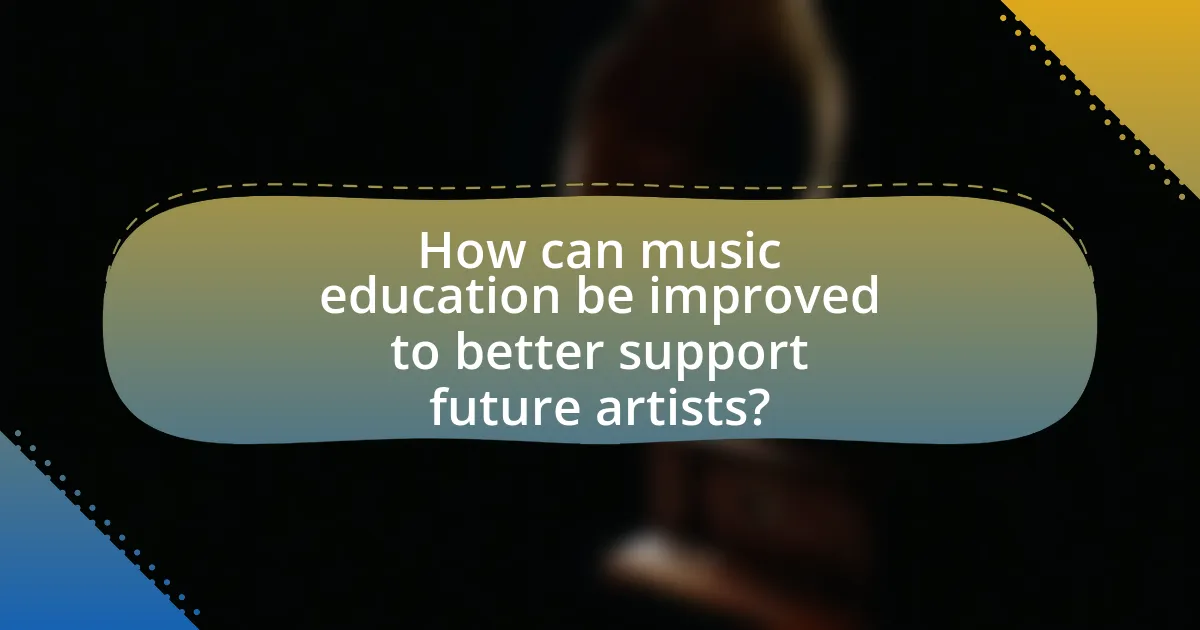
How can music education be improved to better support future artists?
Music education can be improved to better support future artists by integrating technology and contemporary music styles into the curriculum. This approach allows students to engage with current trends and tools, fostering creativity and relevance in their learning. For instance, incorporating digital audio workstations and online collaboration platforms can enhance students’ production skills and adaptability in the modern music landscape. Research from the National Association for Music Education indicates that programs emphasizing technology and diverse genres lead to higher student engagement and skill development, ultimately preparing them for successful careers in the evolving music industry.
What innovative practices are being implemented in music education?
Innovative practices in music education include the integration of technology, such as digital audio workstations and online collaboration platforms, which enhance student engagement and creativity. Research indicates that using tools like GarageBand and Soundtrap allows students to compose and produce music collaboratively, fostering a sense of community and teamwork. Additionally, project-based learning is being adopted, where students create real-world music projects, promoting critical thinking and problem-solving skills. Studies show that this approach not only improves musical skills but also enhances students’ overall academic performance. Furthermore, culturally responsive teaching practices are being implemented to ensure that diverse musical traditions are represented, which helps students connect their personal experiences to their learning.
How can technology enhance music education experiences?
Technology can enhance music education experiences by providing interactive learning tools and resources that facilitate engagement and skill development. For instance, software applications like GarageBand and Sibelius allow students to compose, edit, and produce music digitally, fostering creativity and technical proficiency. Additionally, online platforms such as YouTube and educational websites offer access to a vast array of instructional videos and tutorials, enabling learners to explore diverse musical styles and techniques at their own pace. Research indicates that students using technology in music education demonstrate improved motivation and retention of musical concepts, as evidenced by a study published in the Journal of Music Technology and Education, which found that 85% of students reported increased interest in music lessons when technology was integrated into the curriculum.
What role does community involvement play in enriching music education?
Community involvement plays a crucial role in enriching music education by providing resources, support, and real-world experiences that enhance learning. Engaging local musicians, organizations, and audiences fosters a collaborative environment where students can perform, receive mentorship, and gain exposure to diverse musical styles. Research indicates that schools with strong community partnerships report higher student engagement and achievement in music programs, as evidenced by a study published in the Journal of Research in Music Education, which found that community involvement significantly boosts students’ motivation and skill development.
What practical tips can educators use to enhance their music programs?
Educators can enhance their music programs by incorporating technology, such as music software and online resources, to facilitate learning and engagement. Research shows that integrating technology in music education can improve students’ understanding of music theory and composition, as evidenced by a study published in the Journal of Music Technology and Education, which found that 85% of students reported increased motivation when using digital tools. Additionally, fostering collaboration through group projects and ensemble performances encourages teamwork and communication skills, essential for future artists. Implementing diverse musical genres and cultural perspectives in the curriculum broadens students’ musical horizons and promotes inclusivity, aligning with findings from the National Association for Music Education that highlight the importance of diversity in music education for student engagement and creativity.
